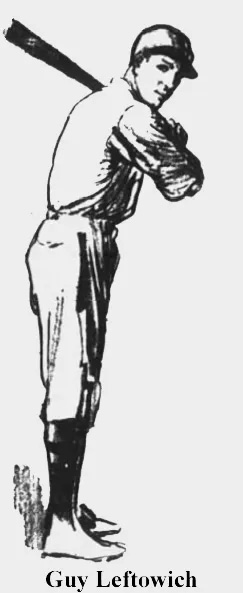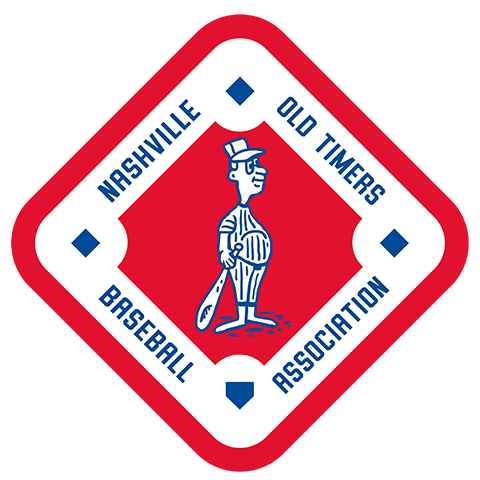
Cold snow covered the Monroe Street pavement as Guy Leftowich pulled his front door tightly shut and slowly shuffled down the porch steps, sure to hold on to the black wrought-iron rail. Christine always insisted he held on, even when it was clear as a bell outside because as he had grown older, his balance was not what it used to be.
He was still strong, his broad shoulders and narrow waist proving he had either been an athlete or was simply a chiseled picture of good health. At the age of 68, he was both. He stood 6’6″, and at 225 pounds, the left-hander had been an ominous presence in his Nashville uniform 20 years ago.
Standing at home plate in spring training once, his 40-ounce bat in his grip, Chuck Dressen, manager of the Nashville Vols ballclub, took one look at him and said, “You’re a pretty big guy, Guy” and when other players heard that, he was forever known as “Big Guy.”
Teammates shortened his last name to “Lefty” after lovingly teasing him as teammates do: “Hey, which is it, Big Guy? Leftowich? Rightowich? Which-away?” they chided.
Always present was a gleaming smile on his face. He loved to play baseball, so it didn’t matter much that his buddies teased him like that.
His real name was Abner Ulysses Leftowich, but his dad called him Guy since he was born (“Hey, look at the big guy”). Neither his father nor fellow players would stand for calling him Abner or Ulysses, so “Big Guy Lefty” it was.
Before venturing out of the house, he checked the temperature from the gadget he and Christine placed outside their kitchen window when they first purchased the bungalow in Germantown. A fan gave it to them as a housewarming gift, a hand-made wooden contraption with a thermometer in a vertical groove and clock below.
It read 12 degrees, but the clock hands were frozen at 7:11 PM, and he knew that certainly wasn’t right, but it could have been the time when the temperature dropped below freezing.
When he reached the sidewalk, he saw the entire neighborhood was covered in at least eight inches of pure white snowfall. The road’s smooth surface told him no one was bold enough to drive this morning, and since it was already 9:30 AM, he doubted many would risk getting out at all today.
“I probably should have broken tradition and gone yesterday,” he muttered to himself. He and Christine made a ritual of going grocery shopping every Christmas Eve morning. Alone with no children to visit them during the holidays, they would spend the rest of their day in the kitchen. Christine kept his mother’s recipe cards, and in the morning, they would go through them together, picking their favorites to make for lunch on Christmas Day. They would sip spiced eggnog with rum and snack on Christmas treats in the evening.
Christine passed away nine months ago; it was a long time for one to be ill like that, nearly two years. She was never sick a day in her life until her energy, vitality, humor, friendship, companionship, and lastly, her breath was taken by cancer.
For 45 years, Guy and Christine had spent every waking moment together, except when he played ball for Gadsden, Tallahassee, Buffalo, or Nashville.
They loved Nashville. It was their favorite city, of the ones they had lived in. The home where they chose to spend their golden years together was only a few blocks away from Sulphur Dell, where he had roamed the outfield hills for nearly 20 years.
The grocery was not far off, only two long blocks, but he continued to waddle through the snow, confident Ethan Fisher would have his store open at Sixth and Taylor.
“Good morning, Ethan. Merry Christmas,” he told the shopkeeper as he kicked the snow from his boots and entered. The old man with the apron was standing near the counter. His right elbow settled on top of the cash register, and his other hand leaned on his hip. His small body was wrapped in a woolen sweater that was much too big.
“The merriest of Christmas to you, too, Big Guy,” he said. “Need some help with your list?”
Guy handed him the piece of paper with things he needed, scratched on it in pencil. Christine kept a notepad by the telephone, and he had written everything down while checking the pantry.
“Let’s see: a dozen eggs, butter, flour, sugar, cloves, ham, a quart of milk. Is this everything?” asked Ethan.
“I think so. We still have brown sugar and powdered sugar left from last year,” Guy answered.
The grocer gathered the things from the list and placed them in a brown paper sack while curiously searching his customer’s facial expressions. He was looking for sadness, or self-pity, or a sense of loneliness so he could console the retired ballplayer, but Ethan did not see it. He knew it was Guy’s first Christmas alone and the entire neighborhood had wondered how he would react.
“Here you go, that will be $3.49.”
Guy handed Ethan the exact change, took the bag, headed out of the store, and turned with a high wave toward the man in the over-sized sweater who shouted, “Merry Christmas!” to him.
The shop’s screen door smacked against the door frame, and as Guy balanced the sack in both arms, he noticed the streets were still empty. Two ruts the width of a car had cut their swathe down Sixth Avenue, with a few wavy ones where the icy mix had kept the driver from navigating a straight line.
It took ten minutes to return home as he stopped to say hello to two neighbors who were clearing their sidewalks with shovels. Another was attempting to conquer the white powder with a broom without much progress.
Two dogs came bounding through a drift near a car sitting in a pile of snow, and Guy lurched to get out of their way and nearly went tumbling, grocery sack and all. He maintained his balance and his groceries, then turned the corner towards his house, pausing to admire the beauty of their cottage and how it glistened in the sun, peeking through the billowy white clouds.
Entering the house, he hung up his coat and put the grocery sack on the floor near his feet as he sat down on the bench in the foyer. He untied his boots and kicked them off, returning them to their resting place under the bench.
He made his way to the kitchen, setting his bounty on the counter. He folded his big arms across his chest and peered at the thermometer once again. This time it said 17 degrees. The time had not changed.
For the first time in many months, sadness overcame him. The walk alone, the return to the house empty of the giggles of his sweetheart, and the cold and snowy day cast a pall over the beautiful home he and Christine had shared.
The idea came to him to build a fire to warm the dreariness of the damp air and his sad thoughts at the same time. He went through the door at the back of the house, gathering firewood and kindling in his arms to make the fire in the living room fireplace.
He dropped to one knee and set the wood on the andirons, checked to be sure the flue was open, and reached for the matchbox on the mantle. Taking a match and lighting it, he moved toward the newspaper wad and lit it, watching the first plumes of smoke make their way up through the chimney opening. The little flames were soon ablaze, and he stared at the burning wood. He thought he could see Christine’s face in the glow.
“But it couldn’t be,” he said softly.
And that is when she appeared to him. The word “Christine” immediately came to his lips. She nodded without a word, smiled at him, and gazed directly into his eyes. He did not need for her to say anything, for he felt her words in his heart.
She was telling him, “I love you, I am near you, and I care for you. Don’t be afraid. Someone is coming.”
He had been afraid. The love they shared was like a rock they could stand on, something they could cling to. But without her, he had not felt that same way in nearly a year, and he had secretly, passionately longed for it.
Her image began to fade. Wanting her to stay, Guy began to cry. Dabbing at his tears with the sleeve of his flannel shirt, the one she gave him the Christmas before, he looked up to see she had disappeared.
Once he recognized she was no longer there, he felt the warmth from the fireplace and how the room began to light up. The curtains, the bookcase, the ceiling fan, and the coffee table, everything in the room began to radiate their own warmth, and he felt Christine’s presence even more.
For over an hour, he remembered and prayed.
“It’s time to cook!” He surprised himself with the sound of his own voice. He remembered how he used to call her from downstairs to rouse her from her nap. He began to pull the bowls and cookware from their hiding places in the cupboards and spent the next four hours busy, but alone, preparing a meal fit for the king and queen who happily resided at the house on the corner of Monroe and Sixth Avenues.
In the evening, after a long nap, he washed and dried the dishes and tucked them back into their places in the cabinets. Taking a loaf of cranberry-banana-nut bread and cutting two slices, he placed them on the Christmas plate Christine loved, the one her grandmother passed down to her. He added cashews, peanuts, and a few pretzels and poured a cup of eggnog spiked with rum, settling in his chair in the living room.
He got up twice to put another log on the fire and stoke it, but he felt peace while watching it burn, sipping on the eggnog and eating his Christmas snacks as usual on this particular night because Christine was there. He felt her presence, and he was happy for the first time in a long while.
He spent a long, silent night, snuggled warmly in the comfort of the bed he and Christine shared for so long.
The next morning, he stuck his head out the front door and saw much of the snow had melted. The sidewalk in front of the house had patches of bare concrete, so he checked the temperature, and it read 32 degrees.
He and Christine usually took a stroll through the neighborhood on Christmas morning unless the weather was too cold or snowy. They would often manage to visit the old ballpark, and Guy wanted to make that journey again today.
He laced his boots and put on his coat and headed out the door.
Only once did he have to step into the street because the sidewalk was frozen. The sun was shining, and the air was warming, so it was a pleasant walk from Jefferson Street and Fifth Avenue to Sulphur Dell’s entrance. The stadium’s outside gave the image of a large birdhouse painted in a cheap green and white, and the idea was not too far off. Pigeons roosting in the rafters’ eaves left markings on the building’s side and on the street and sidewalk below.
Sulphur Dell was famous for the outfield’s peculiar configuration, as the base of the right-field wall was 22 ½ feet above the playing surface. The streets in this part of the city had been built up long ago because the area was prone to flooding, but Sulphur Dell was left as a low-lying ballfield, and the entire park resembled a large washbasin.
That, and the sulphur spring nearby, helped to explain the ballpark’s name. Most ballplayers hated to play there, but Guy handled the outfield hills like no other, traversing the rolling outfield no matter his massive frame.
The front gate was open, and he stepped inside, making his way through the concourse. He stopped and took in the expanse of the field. A rush of energy came over him, making him feel young and excited and ready to play once again.
He barely heard the tender voice from above and behind him.
“Hey, mister,” the boy said. He had been crying, and he had something around his mouth that looked like the residue of cotton candy.
“Well, hello,” he replied. The youngster appeared to be eight or nine years old, dressed in ragged jeans, a worn sweater, and a dirty woolen jacket. On top of his head, he wore a blue baseball cap with a white “SO” sewn on it. Everything the boy wore was tinged in black soot as if he had crawled through a coal chute.
A shout rang out from a row of seats four sections over. “There you are you rascal!” said a policeman. “I’ve been looking everywhere for you.”
The boy hugged tightly to the stadium chair he had chosen as a hiding place. He muffled his crying with his bare hands over his mouth.
Guy recognized the officer, a security guard at the ballpark since 1927 when the grandstand was built.
“What’s the story on him, George?” Guy asked. At first, the old policeman did not recognize him.
“Hey, aren’t you Big Guy Lefty? The one who hit a home run every Sunday home game played at Sulphur Dell the entire season in 1948 and led the league with 65 homers that year? The one who was the only player to wear number 13 in the history of the Vols? The one who…”
“I suppose that’s me,” he interrupted. “It’s both an honor and a pox to be recognized sometimes. Don’t remember me?”
“I’ll just tell you, sometimes my memory lapses, Lefty. I think you are just about the best baseball player to hit this town since Kiki Cuyler,” the man in blue responded.
“Well, thank you, but I was no Kiki Cuyler,” he said. “What about the kid?”
The policeman returned to his reason for being there and told Guy that earlier in the day, the Stratton Orphanage brought a group of boys to the ballpark for a Christmas outing to run the base paths and sled down the outfield’s snowy inclines. Peppermints and oranges were handed out to the boys, too. When the group returned to the home, this one had been missing.
“What’s your name, son?” Guy asked.
“Hector,” the boy replied sheepishly.
Guy wanted to know more. “Hello, Hector, it’s nice to meet you. You can call me Lefty. How old are you?”
“Nine,” the boy answered.
“What are you doing here? Are you lost? Did you forget you were supposed to go back to the orphanage with the other boys?”
“Naw. I didn’t wanna’ go back there. I just want to live at this place.”
Guy stared into the boy’s face for a few moments, then turned to the officer. “Do you think you could wait here with Hector while I run home? I need to get something, and I’ll call the headmaster at Stratton to let him know we’ve found the boy.”
“I guess that will be okay,” said the officer.
Guys legs moved as fast as they could, which was just short of a ramble. Soon he was home, opening the front door and searching through his bedroom closet without removing his coat.
He found his old ball glove, one of his bats, and a couple of baseballs. He faced the front door before he realized he had not phoned the orphanage.
“May I speak to Mr. Denning, please?” he said to the person who answered. Denning immediately came to the phone.
“Mr. Denning, this is Guy Leftowich. Merry Christmas.”
“Merry Christmas to you, too. The old Nashville ballplayer?” asked Denning. “I remember you; you were my favorite!”
“Yes, it’s me, and thank you. Hector has been found, safe and sound at the ballpark, and he is with George, the security guard at Sulphur Dell. Would it be all right if I stay with the boy at the park, just for a little while? I’ll be responsible for him and bring him to the orphanage in about an hour. He needs a friend, and today, I could use one, too. I’d like to spend a little time with him, maybe toss a ball around in the snow for a bit. George will stay there with us, too.”
Hesitating for a few seconds, “I suppose that will be all right,” was the reply.
“Thank you,” said Guy as he hung up the phone and left his house, bounding down the steps and running down the sidewalk as fast as his 68-year-old legs would take him.
For the next 45 minutes, Guy taught Hector, the orphan boy, how to throw, swing the bat, and catch fly balls and grounders. George sat in the stands and smoked his pipe, remembering how the outfielder used to smile so big that fans on the back row of the grandstand could see his wide grin from there.
Today Big Guy Lefty was smiling just like that.
© 2020-22 by Skip Nipper. All Rights Reserved.



